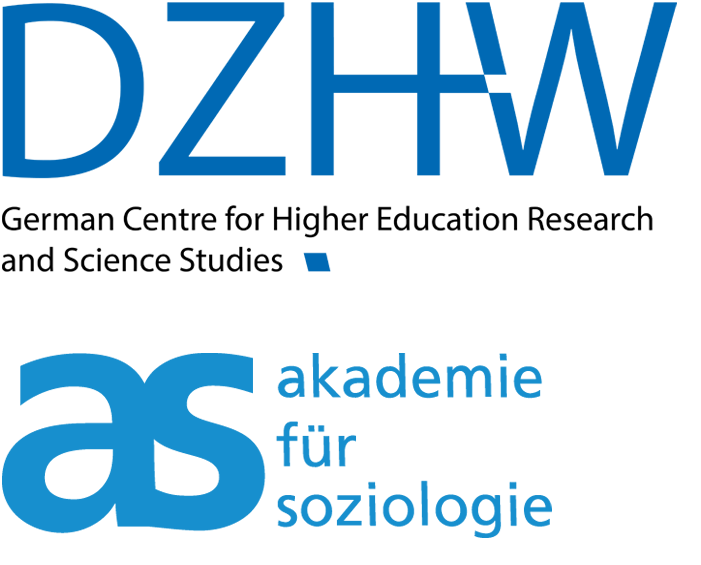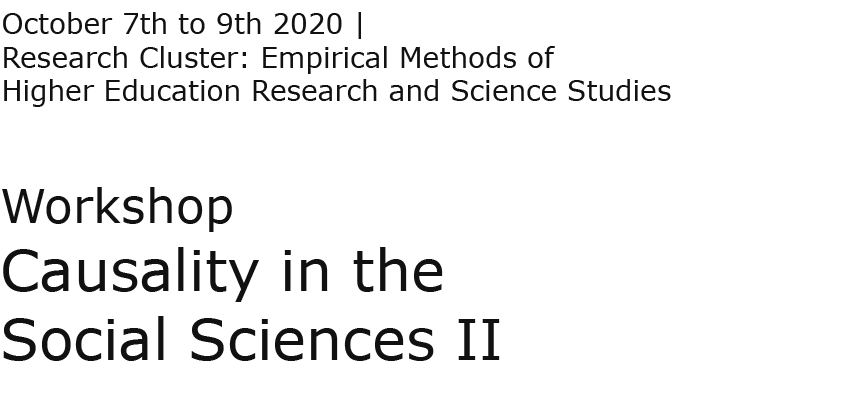
The workshop "Causality in the Social Sciences II" will take place from October 7th to 9th, 2020. The conference is organised by Sebastian Lang and Ulrike Schwabe within the Research Cluster Empirical Methods of Higher Education Research and Science Studies at the German Centre for Higher Education Research and Science Studies (DZHW). The workshop is financially supported by the German Academy of Sociology and the DZHW.
Due to Corona Pandemic we unfortunately had to decide to switch completely to online formats. Nevertheless this enables us to open the workshop for additional audience. If you wish to participate (in the whole workshop or in single sessions) please use the registration form below. Registration will remain open until October 5th, 12:00 a.m.
This website provides all information about the workshop and is updated regularly.
Call for Papers
Last year's Nobel Prize in economics was given to a research group using randomized controlled trials (RCT) to analyse worldwide poverty (c.f. Duflo 2011). Random assignment to treatment and non-treatment conditions in experimental studies is one way to detect underlying causal mechanisms. Nonetheless, the question of causality has become important in other disciplines like social and political sciences, too. Although, the research design in observational data is not ex ante perfect to handle (self-)selection into treatment, various ex-post estimation strategies are able to ensure causal interpretation at least to a certain extent.
We kindly invite young researchers and distinguished scholars from the fields of social and political sciences, economics, philosophy, medical and health sciences and philosophy to contribute to our workshop titled "Causality in the Social Sciences II". This subsequent workshop aims to discuss and reflect up-to-date developments in research and open questions on causality from an interdisciplinary perspective and focusses on three purposes:
- First, it deepens the understanding of causality in the social sciences on a theoretical-analytical level.
- Second, it highlights research designs and statistical methods to support causal interpretation on an applied empirical level. This implies experimental research designs (field and laboratory experiments) as well as estimation strategies for observational data such as matching, instrumental variables, selection correction models, panel regression, regression discontinuity design, and difference-in-differences approaches, and the critical reflection of strengths and pitfalls.
- Third, it provides a place to discuss results of replication studies directly confronting naïve and more sophisticated estimation strategies: Do different methods provide different results?
Hence, core questions to be addressed are related to the general relation between description and explanation, the counterfactual approach itself, adequate estimation strategies for causal inference, advantages and disadvantages of experimental and observational data. But, the workshop is also open to other aspects related to causality and causal inference.
This two-day workshop aims to provide a broad overview on the one hand and to generate practical suggestions on how far the concepts of causality can be tackled in the social sciences on the other hand. The following three speakers will provide keynotes on:
- Prof. Dr. Felix Elwert (University of Wisconsin-Madison, USA): "Mehr Experimente wagen: Causal Inference for Higher Education Research"
- Prof. Dr. Michael Lechner (University of St. Gallen, Switzerland): "Priority to unemployed immigrants? A causal machine learning evaluation of training in Belgium"
- Prof. Dr. Jan Marcus (University Hamburg, Germany): "Federalism and causal inference: Chances and challenges of difference-in-differences"
Besides these general talks, young scholars (PhD students and PostDocs) have the opportunity to present and reflect on how far aspects of causality are important for their research (15-20 minutes presentations and 10-15 minutes discussion). The presentations will be discussed by the invited keynote speakers as well as all the other workshop participants.
Places are limited up to 30 young scholars (PhD students and PostDocs) in order to ensure intensive exchange and feedback on ongoing work. This workshop is supported by the German "Academy of Sociology" and the German Centre for Higher Education Research and Science Studies (DZHW) Hanover. Workshop participation is free of charge. However, travel, accommodation and workshop dinner expenses will not be covered. Though, lunches will be provided. Priority in admission will be given to members of the German "Academy of Sociology".
Applications have to be sent by e-mail ( ) before May, 31st 2020, and should include
- a) an abstract of the paper that will be presented (up to 500 words)
- b) a brief CV (one page).
We look forward to your contribution and welcoming you at the DZHW in Hannover,
Ulrike Schwabe, Sebastian Lang, and Monika Jungbauer-Gans
You can find the Call for Papers as PDF here.
Programme
Jaqueline Lettau: The Effect of Students' Educational Achievement on Subjective Wellbeing: Differences by Students' Grades and Competencies
Judith Lehmann: Does Fat Make You Poorer? The Causal Relationship of Body Size and Socio-Economic Status
Panel B
Lukas Fervers: Are Randomized Trials the Only Game Left in Town? Evidence on the Performance of Nonexperimental Estimators in Educational Interventions
Dimity Stephen: The Difficulties in Disentangling the Causal Effects of Science Policy on Countries' Performance Indicators
Martina Kroher: Is Cheating Behaviour an Inherent Trait or Is It Caused by Learning Processes? Insights From Lab Experiments
Grigory Chernov: Conditional Learning in Non-Transitive Game: An Exploratory Study
Panel B
Mar Cañizares Espadafor & Fabrizio Bernardi: Heterogeneous Causal Effects of Grade Retention
Pedro Pineda, Diego Salazar Morales & Jorge Celis: School Choice, Institutional Environments and the Precarisation of Teachers' Working Conditions in Not-For-Profit Charter Schools
Pia Blossfeld: Some Guidelines for Conducting and Evaluating Randomized Experiments
Knut Petzold & Nicolai Netz: Factorial Survey Experiments and Causal Inference - Potentials and Pitfalls by the Example of a Professors' Survey
Panel B
Frauke Peter: Predicting College Enrolment and Major Choice: Do Personality Traits Matter?
Kai Mühleck: Is a Same-Sex Advisor Beneficial for Doctoral Students?
Martin Friedrich & Nils Teichler: Job Insecurity and Material Deprivation
Markus Wolf: Effects of Welfare Benefit Sanctions: A Trade-Off Between Sanction Effects on Unemployment Duration and on Employment Quality?
Hannah Illing & Theresa Koch: The Biggest Loser: Costs of Job Loss for Migrants and Natives
Panel B
Frederike Hertweck: Are Large Entry Cohorts Bad for Students? New Evidence From Administrative Data and an Unusual Schooling Reform
Stanislav Avdeev: Zero Returns to Higher Education: Evidence From a Natural Experiment
Simone Maxand: Causality in Multivariate Time Series: Statistically Identified Structural VAR Models
Stefan Stahlschmidt: Expectile Treatment Effects: An Efficient Alternative to Compute the Distribution of Treatment Effects
Lukas Fervers & Joachim Piepenburg: Is It More Than Just a Loss of Power? Testing for Endogenous Panel Attrition in Online Surveys in the Context of a Randomized Controlled Trial
Panel B
Michael Kühhirt: Models of How the World Works: Directed Acyclic Graphs as Tool for Theory Building and Theory Testing
Patrick Klösel: Finding Causality in Econometrics Identification Using Directed Acyclic Graphs
Naftali Weinberger: Modelling Racial Discrimination Using Causal Mediation Techniques
You can find the Programme as PDF here.
Registration
Unfortunately the registration deadline has already been reached. Further registration is not possible at this time.
Venue
The workshop will take place as online conference. All registered participants will receive the access data via e-mail. If you should have registered and did not receive any access data by Tuesday, 6th October, 4 p.m. (UTC+2), please contact .



